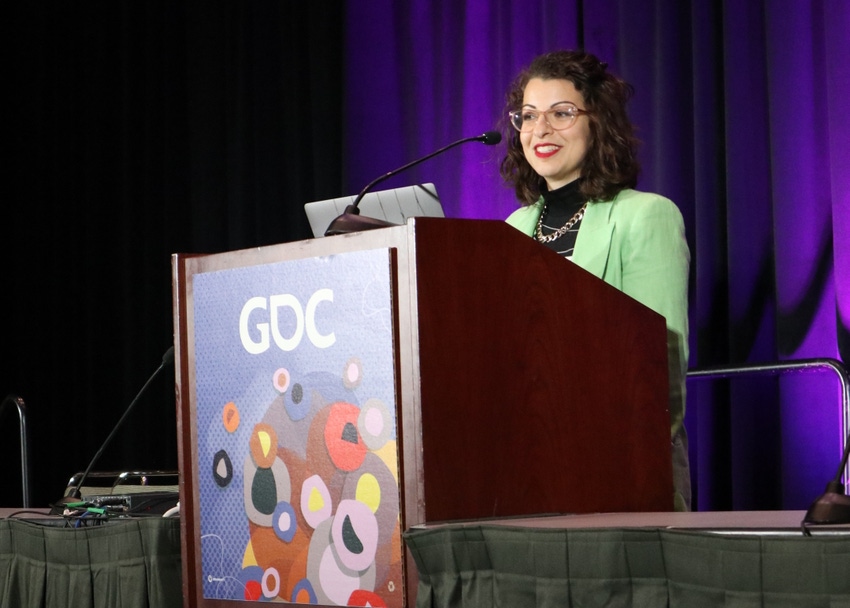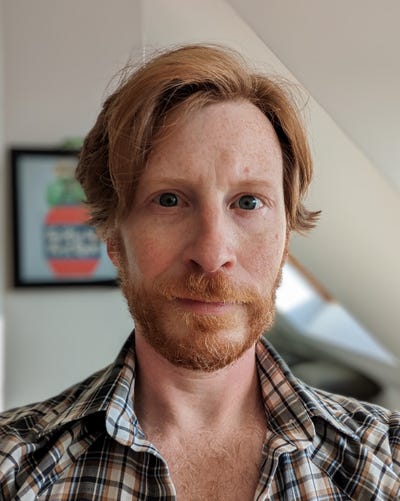.png?width=700&auto=webp&quality=80&disable=upscale)
At GDC 2023, Anita Sarkeesian described why current DEI initiatives at gaming companies are doomed to fail—and how "transformative justice" might foster better healing, more equitable workplaces.

Researcher and critic Anita Sarkeesian has traditionally spoken at the Game Developers Conference with her acclaimed video series Feminist Frequency at the forefront. Last year, that took the form of a retrospective that explored what her team's video series has accomplished over a span of ten years, with equal eyes towards its past impacts and its hopes for the game industry's future.
At this year's GDC, Sarkeesian approached the podium with no designs on either recapping or resembling that series. Her speech was not about tropes that reinforced negative representation on gamers' TV screens. It was instead about an industry-wide status quo that, according to her research and insider sources, continues to reinforce negative representation inside the companies who make those games.
"Diversity, equity, and inclusion (DEI) efforts are framed as attempts to transform workplace environments into spaces that are welcoming for all people, especially those historically underrepresented," Sarkeesian said. "I'm not here to tell you that DEI is broken. I'm here to tell you that DEI is working as intended. And that's the problem."
"A shield against criticism and real change"
Sarkeesian began by recounting increased public scrutiny and conversation about representation inside tech companies, particularly gaming companies, in the wake of social movements like #MeToo and Black Lives Matter. She pointed to a measured surge in DEI hiring throughout 2020, though she questioned the motives for these games industry hires. "Some were doing this with a sincere hope for making their studios a better place to work for their marginalized workers," she said. "Some of them were doing it as a performative response to social pressure."
The title slide from Anita Sarkeesian's presentation at GDC 2023.
Thanks to her work at Feminist Frequency, along with her operation of the Games and Online Harassment Hotline, Sarkeesian has since had the opportunity to speak directly to DEI managers and stakeholders within the gaming industry. While she didn't quantify how many negative anecdotes she had accumulated in the past two years, the conclusion she reached was damning: "It seems that DEI has been co-opted by the powerful to become a shield against criticism and real change."
Sarkeesian couched that conclusion with an insistence that DEI stakeholders inside of gaming and tech workplaces "often make incredible sacrifices to do anything they can to make their immediate world a better, safer place." But those well-meaning staffers face numerous overt and subtle challenges, Sarkeesian said. HR departments operate without a clear understanding of "how systems of oppression affect all levels of decision-making and interpersonal interactions," and they're not flexible enough to adjust to DEI-specific recommendations.
At affected companies, internal legal teams "micromanage" communications on DEI-related topics, either internally or externally, to mute productive conversations before they can even begin. Sarkeesian suggests that more open conversations about DEI in the workplace, or overt efforts to support "identity-specific" spaces inside of companies, are typically treated by gaming companies' legal teams as "a liability or a unionization threat."
"People make systems, and systems make people"
Perhaps toughest of all, the staffers responsible for official DEI efforts at companies are set up to fail in multiple dimensions. Sarkeesian said these are typically handled by staffers who are not given "official titles or even compensation," and are "too often" hired in a part-time or contract capacity. Budgets for these departments tend to "magically dry up" once public attention about the topic in question wanes, or they typically get hit early in any tech company's rounds of layoffs. For those staffers who somehow remain, Sarkeesian suggested that the aforementioned points of DEI resistance lead to "quick burnout" and thus "incredibly little time" for accumulated knowledge or collective staff effort to make a positive impact.
Sarkeesian described current DEI initiatives as "attempts to produce equity within a system that is fundamentally inequitable and resists equity. This is because formal corporate structures are enormously resistant to change."
All the while, Sarkeesian posited, the systems that enable harm and unfair treatment of marginalized communities inside of tech companies did not spring up out of thin air. "People make systems, and systems make people," she said. "We have to think beyond an individual level and understand that this isn't about removing a couple of bad actors. But there's also the matter of a 'path of least resistance.' It is so much easier for a corporate board or C-suite to continue operating in the same way they have for decades, rather than approach change with curiosity and excitement, because there's a lot of dollars on the line."
In her view, a hire-for-DEI track, as applied to gaming business as usual, is doomed to fail if it's not retuned. "The answer is not going to be one action, training, or agency you eventually hire..." Sarkeesian said. "We need to shift the foundational understanding that drives how we treat each other."
"Responding to violence and harm without creating more violence and harm"
Sarkeesian admitted that such efforts don't currently fit into a one-strategy-fits-all toolset, but she did optimistically point to a touchstone that could recalibrate many companies' thoughts on DEI: transformative justice. She turned to an explanation from the Barnard Center for Research on Women, which she discovered while working on guiding principles for Feminist Frequency. The 10-minute video begins by breaking down more common societal concepts like punitive justice ("you're removed from a community because you've done harm") and restorative justice ("restoring a relationship that existed before harm happens").
The cited experts argue that both of those concepts ultimately fail for the same reason: "if the original conditions were unjust, then returning to those original conditions [before harm took place] is not actually justice." Transformative justice differs, then, by "responding to violence and harm without creating more violence and harm," and Sarkeesian suggested that companies allied on the principles of DEI in the workplace could follow that path to a better workplace for all involved.
"Harm does not happen in a vacuum," Sarkeesian said. "When something unacceptable happens, it's not enough to accuse a few involved parties. We must look at the conditions that allowed this to happen. What roles did everyone else around them play? Who was complicit? What in our culture modeled and rewarded this behavior? What systems of power and oppression are present in these dynamics? We need to break cycles of harm and prevent future violence. It's not enough to respond only to the current incidents of harm that happen now. Are we trying to brush this under the rug again? Or are we doing anything to prevent this from happening again?"
Sarkeesian clinches this perspective by insisting that support in a workplace harm incident should work in all directions. For those who were harmed, support their healing with "care, rejuvenation, healing, and opportunities and post-traumatic growth." Likewise, those who inflicted harm need support in their path to accountability: "ways to reflect and better understand their own behavior," Sarkeesian said. "Why was it harmful? How might they change it? These two [sides] are interconnected, because accountability enables a person to truly offer substantial acknowledgement, apology, and repair to those that they harmed."
Active acknowledgement, not zero tolerance
To these ends, Sarkeesian suggested radical, top-down ideas that gaming and tech companies might use to adopt the best aspects of the transformative justice model.
High on her list was discontinuing policies like "zero tolerance" in favor of "active acknowledgment" of workplace issues. She suggested a company statement such as, "Harassment, abuse, and assault have happened here. People were hurt and treated in ways that are not acceptable. The individuals are responsible, but so are we as a culture and a community that allowed it to happen. Here's how we're going to start changing the way we talk about and look out for those things."
Sarkeesian suggested that an active acknowledgement method might include admittances that a company has previously "not been welcoming to women, BIPOC, trans, queer, and disabled folks, and here's how we're going to start trying to make it right." This would create a smoother path for "lower-level, everyday interventions," and it would add workplace nuance that a zero-tolerance policy often erodes. "[Zero tolerance] doesn't allow for mistakes to happen, it makes people afraid to bring up anything in case they will be punished for being wrong, and it especially doesn't allow room for growth or change," Sarkeesian said.
To ease team members into such systems, Sarkeesian suggesting a series of meetings that she dubbed "caucuses of privilege," which would allow members of a privileged class to meet, ask potentially awkward questions, and openly discuss their privileges alongside their concerns and fears—all without burdening the very people who might already be suffering from unrecognized privilege in the workplace. In other words, Sarkeesian said, "don't ask marginalized people to have to convince you of their humanity."
The result of such efforts, Sarkeesian hoped, would be one where microaggressions can be safely and smoothly addressed in ways that make all employees happier and more productive. "We need to usher in a workplace where, when a marginalized person is talked over in a meeting, when an inappropriate joke is made, when a [video game] character rooted in harmful stereotypes is pitched, there are clear avenues to surface these issues without retaliation and retribution, or shaming and silence," she said.
Read more about:
FeaturesAbout the Author(s)
You May Also Like









